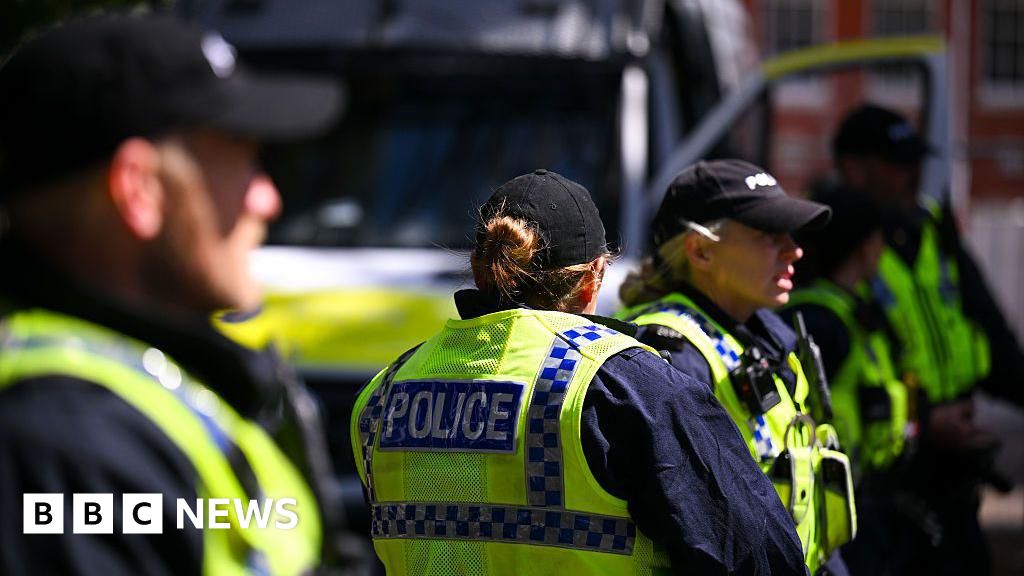What challenges will new guidance on ethnicity pose for police?
- BBC News
Trouble on the streets, rising tension in communities, and angry scenes outside immigration hotels - in many cases fuelled by rumours on social media.
Moments like these are what police chiefs and the government are keen to avoid.
Riots across England and Northern Ireland last summer were partly triggered by misinformation on social media, which said the man responsible for the murder of three girls in Southport was an illegal migrant.
But in recent months, police have been inconsistent on when they have disclosed the ethnicity of a suspect.
When a car drove into a crowd at a bus parade for Liverpool FC in the city in May, police were quick to say a white man had been arrested over the incident to defuse any trouble.
But Warwickshire Police was not so forthcoming with details earlier this month when two men in Nuneaton were charged in connection with an alleged rape of a 12-year-old girl.
Reform UK claimed the men were asylum seekers, and reports suggested they were Afghans - but this was not confirmed by police.
This led to claims of a "cover-up" - something Warwickshire Police fiercely denied.
The force said it simply followed police guidance, which at the time did not include revealing the ethnicity and immigration status of suspects.
The ongoing debate has led to an update in police guidance on what to disclose when someone is charged with a crime.
The National Police Chiefs Council, along with the College of Policing, have come up with the advice for forces across the UK.
It states they should consider revealing the suspects ethnicity and nationality in high-profile and sensitive investigations and operations.
But how will it work in practice?
The guidance says if someone is arrested, officers should provide only the suspects sex and age.
Police want to be certain there are no legal issues surrounding disclosing more details, and the decision to do so is up to individual forces.
When the suspect is charged, it says police can provide their name, date of birth and address.
This has been updated to say police should consider revealing the race and nationality.
The BBC understands this will apply when the case is of public interest or involves a serious offence - such as murder, rape, or an assault involving numerous victims.
However, there is no single definition of what constitutes a serious offence and this would need assessing on a case-by-case basis.
Ultimately, it will be up to the individual police force to decide what it discloses, but decisions are likely to be based on factors such as the risk of local unrest or inflammatory social media rumours.
There are concerns among some police officers that revealing these details could be counterintuitive.
One Metropolitan Police officer told the BBC: "Stating whether someone is black or brown could fuel the far-right and racism towards certain communities, rather than calm it down."
Another said it was important not to disclose more information than is necessary to avoid influencing a future trial - although revealing a suspects race and nationality is unlikely to do this.
It is also up to the force whether they give these details even earlier - such as when someone is arrested - if for example they sense potential trouble in the community.
The immediate aftermath of a high-profile, public incident could be when the risk of online speculation and tensions is highest, but a charging decision may not be made for at least a day or two.
Police will need to assess whether there are any legal issues in releasing more information at the point of arrest, such as the right to a fair trial and presumption of innocence, as well as the suspects right to privacy.
The former chief constable of Greater Manchester Police, Sir Peter Fahy, believes it will cause suspicion and misunderstanding if police release some details in certain cases and not others.
"People could create a story which isnt true because theyve disclosed certain information and its a dangerous road to go down," he said.
But he argues police are in an impossible situation because social media is fast moving, and officers need to quash falsehoods as quickly as possible.
It will be up to the Home Office whether a suspects immigration status will be revealed.
But some police officers are concerned this could cause tension between the government and police chiefs.
A senior police officer said: "Policing should be a job for police officers and not ministers."
The new guidance is not permanent yet, with the Authorised Professional Practice (APP) - the official source of professional practice for policing - currently reviewing it.